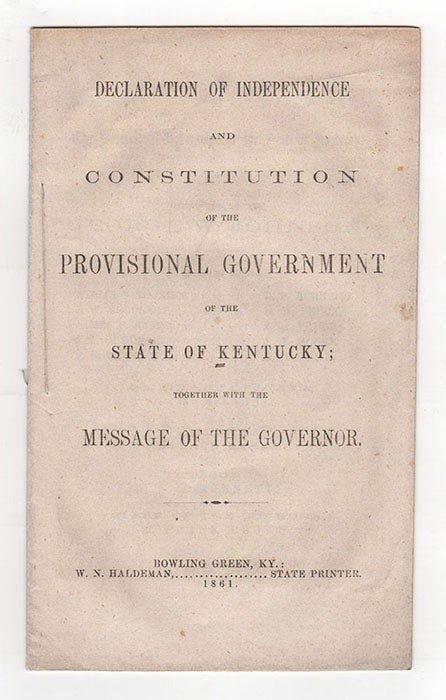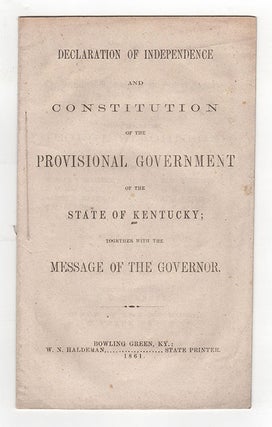Declaration of Independence and Constitution of the Provisional Government of the State of Kentucky; together with Message of the Governor.
Bowling Green, KY: W. N. Haldeman, State Printer, 1861. 8vo., pp. [5] + 6–16; printed self-wrappers; stab-sewn as issued. First edition of this rare first Confederate Kentucky imprint and the earliest published record of the so-called Russellville Convention. At the beginning of the Civil War Lincoln is reputed to have said, "I hope to have God on my side, but I must have Kentucky." The state of Lincoln's birth, Kentucky—with plentiful rivers, railroads, mules, horses, and men—was pivotal in the race to secure political and material advantage during the early days of the conflict. The President feared that losing the Bluegrass State would cause Missouri and Maryland to move into the Confederate camp as well. As historian Kenneth W. Noe has written: “Victory likely would go to the belligerent that occupied the border states, and securing that vital region meant holding Kentucky at all costs.” Following Lincoln's immediate call for 75,000 volunteers at the outbreak of hostilities, Governor Beriah Magoffin, whose sympathies lay with the Confederates, refused the President's request, stating that "Kentucky will furnish no troops for the wicked purpose of subduing her sister Southern states." In May 1861 the state passed a declaration of neutrality, with Magoffin hoping to broker a compromise between North and South. The governor's neutral strategy soon came apart, however, as Union and Confederate recruiters scoured the state for volunteers. The Union demand for troops in particular angered many Kentuckians, and pushed some to call for secession. However, as elections during the summer of 1861 proved, pro-Union forces were too strong in the state to make secession a practicality. In fact, Confederate forces were ordered by the legislature to leave the state in September, over the governor's objections. On November 18, 1861, 116 delegates from 68 counties met in Russellville to ratify an order of secession and form a Confederate shadow government to compete with the administration in Frankfort. George W. Johnson was elected Governor; the delegates also designated Bowling Green (then under the control of Confederate general Albert Sidney Johnston) as the Confederate State capital. The pamphlet at hand prints several of the proceedings from the Convention, beginning with a roster entitled Provisional Government of the State of Kentucky, naming Johnson as Governor, Robert McKee as Secretary of State, Richard Hawes as Auditor, Theodore L. Burnett as Treasurer, ten members of the (legislative) Council, and the Clerk of the Council. Next, the Declaration of Independence and Constitution follows on pages five and six. The opening paragraph of the Declarationcharges that the Federal government has "usurped" the "rights and liberties of the States and the people" and has substituted Constitutional authority for a "central despotism founded upon the ignorant prejudices of the masses of Northern society…" On the basis of protecting "our liberties, our property, our homes, and our families" the secessionists "hereby forever sever our connection with the Government of the United States, and…hereby declare Kentucky to be A FREE AND INDEPENDENT STATE, clothed with all power to fix her own destiny, and to secure her own rights and liberties." The Plans of Provisional Government on pages six and seven outlines the operation of government, denoting the responsibilities and duties of the Executive and Legislative branches. Finally, a Message of the Governor to the Council is printed on pp. 9–16, and signed in type at the end. The message reviews first the national events which led to Southern secession, arguing that it was Lincoln and Congress which "broke the Constitution in every clause." The message continues with a description of recent events within the state, whereby the neutrality of the commonwealth was said to have been violated by the Unionists, though it was in fact Confederate General Leonidas Polk who initially ordered troops to occupy the strategic city of Columbus. The provisional government never replaced the government in Frankfort, nor did it enjoy widespread support. Nevertheless, it was recognized by the Confederate States of America and Kentucky was admitted to the Confederacy on December 10, 1861. Following Grant's victory at the Battle of Fort Henry in February 1862, the provisional government moved to Tennessee. Governor Johnson was killed at the Battle of Shiloh in April 1862 while serving under General Breckinridge. He was replaced by Richard Hawes, whose administration spent more time outside the state than within during the remainder of the war. Rare in trade: only three copies recorded at aucton in American Book Prices Current from 1975 to present. OCLC locates twelve copies, with copies reportedly at three other locations. This pamphlet was reprinted on the centenary anniversary of the Russellville Convention. REFERENCES: Parrish & Willingham 2971. CONDITION: Very good, first and final pages lightly soiled; few pencil annotations.
Item #1767
Price: $9,500.00



